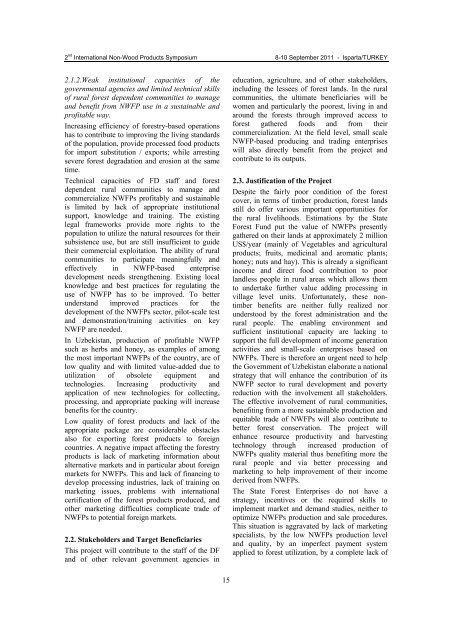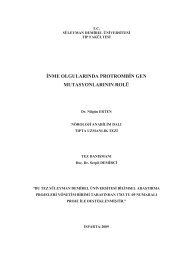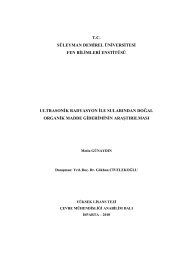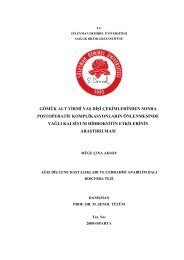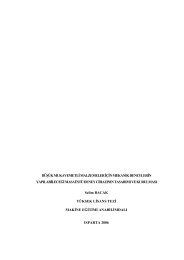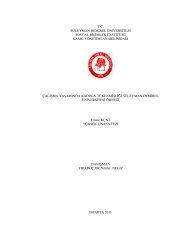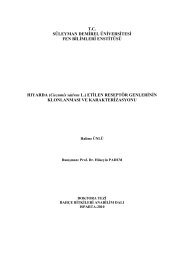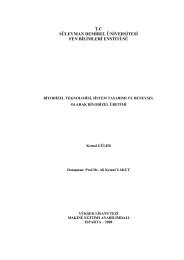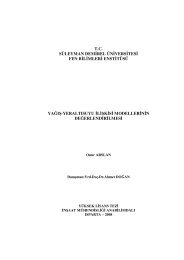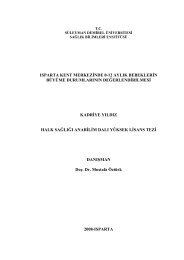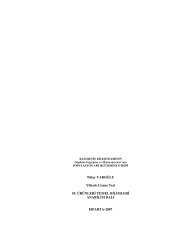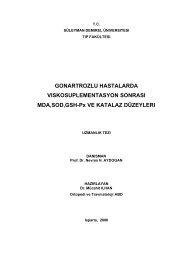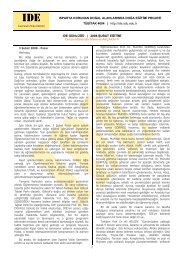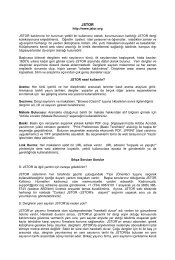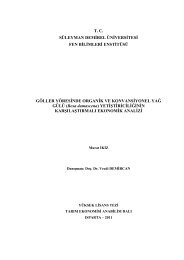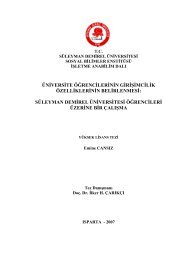Proceedings Book / Bildiri Kitabı - Orman Fakültesi - Süleyman ...
Proceedings Book / Bildiri Kitabı - Orman Fakültesi - Süleyman ...
Proceedings Book / Bildiri Kitabı - Orman Fakültesi - Süleyman ...
You also want an ePaper? Increase the reach of your titles
YUMPU automatically turns print PDFs into web optimized ePapers that Google loves.
2 nd International Non-Wood Products Symposium 8-10 September 2011 - Isparta/TURKEY<br />
2.1.2.Weak institutional capacities of the<br />
governmental agencies and limited technical skills<br />
of rural forest dependent communities to manage<br />
and benefit from NWFP use in a sustainable and<br />
profitable way.<br />
Increasing efficiency of forestry-based operations<br />
has to contribute to improving the living standards<br />
of the population, provide processed food products<br />
for import substitution / exports; while arresting<br />
severe forest degradation and erosion at the same<br />
time.<br />
Technical capacities of FD staff and forest<br />
dependent rural communities to manage and<br />
commercialize NWFPs profitably and sustainable<br />
is limited by lack of appropriate institutional<br />
support, knowledge and training. The existing<br />
legal frameworks provide more rights to the<br />
population to utilize the natural resources for their<br />
subsistence use, but are still insufficient to guide<br />
their commercial exploitation. The ability of rural<br />
communities to participate meaningfully and<br />
effectively in NWFP-based enterprise<br />
development needs strengthening. Existing local<br />
knowledge and best practices for regulating the<br />
use of NWFP has to be improved. To better<br />
understand improved practices for the<br />
development of the NWFPs sector, pilot-scale test<br />
and demonstration/training activities on key<br />
NWFP are needed.<br />
In Uzbekistan, production of profitable NWFP<br />
such as herbs and honey, as examples of among<br />
the most important NWFPs of the country, are of<br />
low quality and with limited value-added due to<br />
utilization of obsolete equipment and<br />
technologies. Increasing productivity and<br />
application of new technologies for collecting,<br />
processing, and appropriate packing will increase<br />
benefits for the country.<br />
Low quality of forest products and lack of the<br />
appropriate package are considerable obstacles<br />
also for exporting forest products to foreign<br />
countries. A negative impact affecting the forestry<br />
products is lack of marketing information about<br />
alternative markets and in particular about foreign<br />
markets for NWFPs. This and lack of financing to<br />
develop processing industries, lack of training on<br />
marketing issues, problems with international<br />
certification of the forest products produced, and<br />
other marketing difficulties complicate trade of<br />
NWFPs to potential foreign markets.<br />
2.2. Stakeholders and Target Beneficiaries<br />
This project will contribute to the staff of the DF<br />
and of other relevant government agencies in<br />
education, agriculture, and of other stakeholders,<br />
including the lessees of forest lands. In the rural<br />
communities, the ultimate beneficiaries will be<br />
women and particularly the poorest, living in and<br />
around the forests through improved access to<br />
forest gathered foods and from their<br />
commercialization. At the field level, small scale<br />
NWFP-based producing and trading enterprises<br />
will also directly benefit from the project and<br />
contribute to its outputs.<br />
2.3. Justification of the Project<br />
Despite the fairly poor condition of the forest<br />
cover, in terms of timber production, forest lands<br />
still do offer various important opportunities for<br />
the rural livelihoods. Estimations by the State<br />
Forest Fund put the value of NWFPs presently<br />
gathered on their lands at approximately 2 million<br />
US$/year (mainly of Vegetables and agricultural<br />
products; fruits, medicinal and aromatic plants;<br />
honey; nuts and hay). This is already a significant<br />
income and direct food contribution to poor<br />
landless people in rural areas which allows them<br />
to undertake further value adding processing in<br />
village level units. Unfortunately, these nontimber<br />
benefits are neither fully realized nor<br />
understood by the forest administration and the<br />
rural people. The enabling environment and<br />
sufficient institutional capacity are lacking to<br />
support the full development of income generation<br />
activities and small-scale enterprises based on<br />
NWFPs. There is therefore an urgent need to help<br />
the Government of Uzbekistan elaborate a national<br />
strategy that will enhance the contribution of its<br />
NWFP sector to rural development and poverty<br />
reduction with the involvement all stakeholders.<br />
The effective involvement of rural communities,<br />
benefiting from a more sustainable production and<br />
equitable trade of NWFPs will also contribute to<br />
better forest conservation. The project will<br />
enhance resource productivity and harvesting<br />
technology through increased production of<br />
NWFPs quality material thus benefiting more the<br />
rural people and via better processing and<br />
marketing to help improvement of their income<br />
derived from NWFPs.<br />
The State Forest Enterprises do not have a<br />
strategy, incentives or the required skills to<br />
implement market and demand studies, neither to<br />
optimize NWFPs production and sale procedures.<br />
This situation is aggravated by lack of marketing<br />
specialists, by the low NWFPs production level<br />
and quality, by an imperfect payment system<br />
applied to forest utilization, by a complete lack of<br />
15


